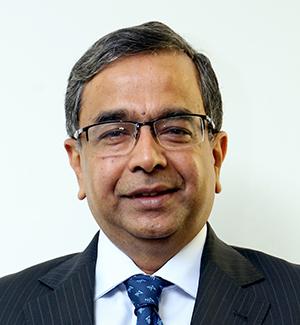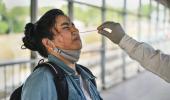'Since many people are vaccinated, this virus is now concentrating on the throat and the nose and replicating fast and transmitting also very fast.'
'That's because the current vaccines will not be able to fight it when it is in the throat, nose or the mouth.'

As people of India relaxed with the hope that the pandemic was on its way out, there is a sudden increase in coronavirus cases mostly in Maharashtra and Kerala.
Should we be worried? Will there be another wave?
"Whenever a new variant comes or immunity from prior infection or vaccination wanes in the population, and when there is a complete abandonment of covid appropriate behaviour, we are seeing the number of cases rising in different parts of the world," Dr Srinath Reddy, President, Public Health Foundation of India and former head of the department of cardiology at the All India Institute of Medical Sciences, tells Rediff.com's Shobha Warrier
Is the sudden spurt in the number of covid cases surprising?
Not entirely. That's because people being vaccinated against covid doesn't mean they are protected against infections of all kinds.
Since the middle of 2020 and even in 2021, we have realised that vaccinations even with boosters do not prevent breakthrough infection; infections still can happen.
Vaccination only prevents severe illness which lands people in hospitals and intensive care units.
Whenever a new variant comes or immunity from prior infection or vaccination wanes in the population, and when there is a complete abandonment of covid appropriate behaviour, we are seeing the number of cases rising in different parts of the world.
These three factors are the reasons behind the resurgence of covid cases.
So, it is not surprising that it is happening in India too.

In such a situation, what should be the strategy to fight covid now?
It is very clear that we will not be able to use only vaccination as the strategy to prevent covid. But we have understood that vaccination has been highly useful in preventing severe illness.
And in the case of India, it has achieved high levels of vaccination though not in terms of the booster but at least in terms of the first two doses.
So, it is important that those who are eligible for the booster should go and get it as well, because there is evidence that the efficacy of vaccines after two doses, wanes after six months.
So, the booster does help in providing additional protection.
But those who have got the booster also should continue to protect themselves when the cases are rising by wearing masks and avoiding very crowded, ill-ventilated places.
We should get on with our normal lives, work and also travel when required. But it is better to avoid unnecessary travel, and crowded places.
These are some of the precautions people should take, especially masking at public places and indoors. This is the best way to prevent infections by any variant.
The simple mantra should be: To avoid severe illness, get vaccinated. And if you want to avoid infections, wear a mask.
We see that those who had covid are getting infected within a very short period. Does that mean immunity and the antibodies developed after the infection won't last longer?
Not necessarily so. There are different types of antibodies and different types of immunity.
First of all, these are systemic vaccines given by muscular injection. And they produce systemic immunity.

What does systemic immunity mean?
The antibodies we produce from the injections will fight the virus after it enters the blood stream. But they do not fight the virus when they are in your throat or nose or the mouth mucous membranes.
To fight the virus when they are in the mucous membrane, you require a different type of antibodies. Those antibodies are called secretory antibodies, and they are produced by different mechanisms and not by the current vaccines.
The present vaccines produce antibodies that can fight the virus when it is in the blood stream or in the lungs or wherever the virus gets in. But they do not fight when the virus is in the mucous membrane.
So, the virus in the mucous membranes of the mouth, nose or throat can cause mild illness like sore throat, cold, etc.
It can also be transmitted to other people if you are not wearing a mask.
I have pointed this out from 2020 onwards that the current vaccines are good only in preventing severe clinical covid illness, and not completely preventing transmission.
Yes, they have reduced the transmission to some extent, because when your illness doesn't last long, you don't transmit too many viral particles for too many days.
But the virus is also adapting to increase its infectivity and replication rate.
Since many people are vaccinated, this virus is now concentrating on the throat and the nose and replicating fast and transmitting also very fast.
That's because the current vaccines will not be able to fight it when it is in the throat, nose or the mouth.
Though the vaccines can prevent severe illness, it cannot prevent mild infection.

Does that mean we need a different kind of a vaccine to fight the virus now?
Yes, some of them are being developed, and some are at the trial at the moment.
You have to also understand that success with the mucosal virus has not been very high in other conditions previously.
Some Canadians are saying that they probably have a vaccine that will protect against the mucosal infections. But those are all in the early-stage clinical trials.
Unless the last trials are completed, we will not be able to say for sure how successful they are.

Do you think the experts have really understood the virus in the last two years, or are they still learning?
We are all learning. All the experts are still in the process of learning.
In 2020, everybody said once we get the vaccine, we will get rid of the virus, or once we get the antiviral drug, we will get rid of the virus.
But neither of them is completely effective now.
The virus is adapting very fast. The lesson we have learnt is, we will never get rid of the virus. The virus will stay with us.
Whether it is in the present form or some other form, it will be with us.
It will continue to trouble us with minor outbreaks. But we are unlikely to see severe illness requiring hospitalisation.
All we can do is to protect ourselves from severe illness through vaccination, and protect ourselves from infection by wearing a mask.
So, whenever the infections go up, we should wear a mask.
It is like using an umbrella during the rainy season.
The viruses are here for millions of years, even before the humans came. All we have to do is, to learn to co-exist with them.
So far, only two viruses have been eradicated: the smallpox virus and rinderpest in cattle.
All the other viruses are still there; even the polio virus in its natural form is still there in Afghanistan, Pakistan and it has now been reported in Nigeria.
It is very difficult to get rid of viruses especially the corona virus which can change its form constantly.
We also have influenza viruses which keep changing its form.

Do you think it's because people have become relaxed all over the world and move around without a mask that the cases are going up?
I don't think we can tell people to wear a mask all the time. But whenever the cases go up, we must wear masks.
It's just like people in Japan and South Korea wear a mask when they get a cold.
Unlike the usual cold or flu, a covid infection stops normal life...
It need not stop normal life at all. If people are protected against severe illness by vaccinating themselves, they can go to work and also travel.
The simple precaution you can take is wear a mask when cases go up.
Normal life need not be stopped completely.
 IMAGE: Dr Srinath Reddy. Photograph: Kind courtesy Dr Srinath Reddy
IMAGE: Dr Srinath Reddy. Photograph: Kind courtesy Dr Srinath ReddyWould you say, we need not be worried about the cases going up periodically?
No. As long as hospitalisation rates remain low, we need not be worried.
But we have to contain the transmission for a variety of reasons.
High number of cases need resources. Even if you are mildly ill, and if you have to isolate yourself for 10 days, work suffers.
If a large number of people have to isolate themselves in a place, work suffers.
Then, testing also is expensive.
So, we need to contain the transmission.
But we need not panic about it as severe illness or hospitalisation is not happening.
So, you can continue to work, you can continue to study and you can continue to travel if necessary, you can continue to lead normal lives with some caution particularly when cases go up.
But there is no need to panic.
Feature Presentation: Ashish Narsale/Rediff.com










